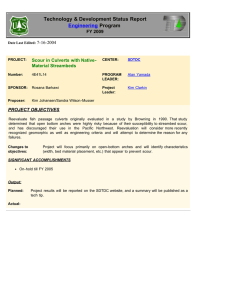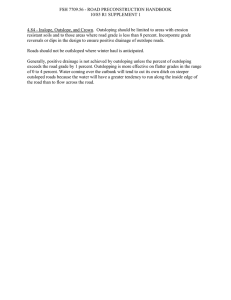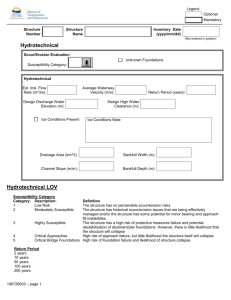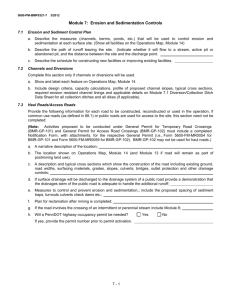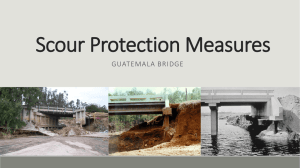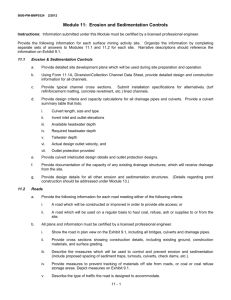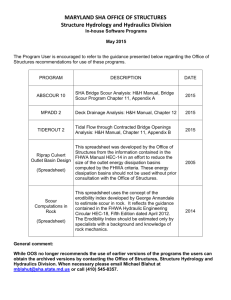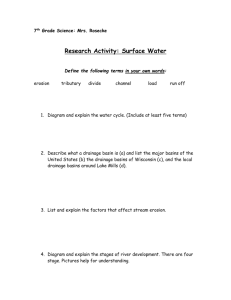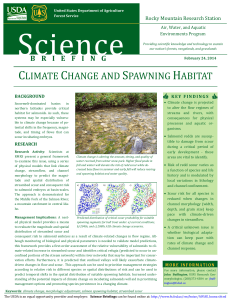Soil and Water Road Condition Index SDTDC Prepared by:
advertisement
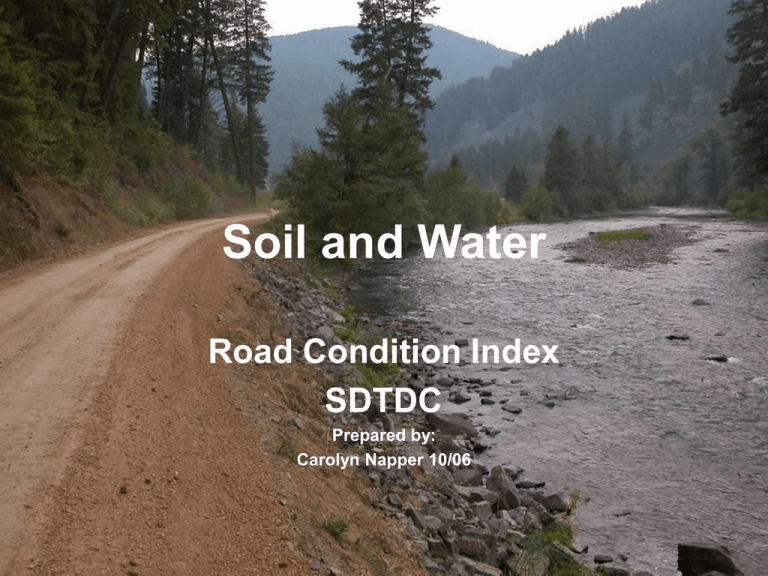
Soil and Water Road Condition Index SDTDC Prepared by: Carolyn Napper 10/06 Project Update 10-17-06 • Literature search of existing indices • Internal search of FS road data collection tools and methodologies • Development of a draft index • Field testing of index nationally Maine S&PF BMP evaluation methodology developed by S&PF Partially funded by EPA and developed software program during beta-testing R-5 LTBMU •Characterization of roads for public information •WEPP as comparison R-5 Los Padres Closed road R-5 San Bernardino STEEP hillslopes Road segmentation R-2 Bighorn NF Existing survey by watershed Identify work, implement contracts to reduce sediment delivery to streams on all road levels. R-2 White River Road-stream connectivity Gully formation R-2 WCP handbook Breckenridge Ski Area R-6 Okanogan NF R-10 Tongass Subsurface Drainage R-9 White Mountain NF Level 2-gated URCI- Bob Eaton, process for evaluation of a road segment R-8 Ozark-St Francis TNC &FS road inventory Trimble w/Infra and Terra Sync software 10 mi/rd per day/crew R-8 Ouachita NF Road surveys for Roads analysis, NEPA, using WEPP, relative abundance of benthic fish tied to roads. Pursuing KV dollars for road improvement work. Infra data not reliable Goal of SWRCI Project • Need to measure the performance of the road improvement and road maintenance programs in meeting our responsibility for protecting watersheds. – Soil and Water road condition index – Photo Guidebook to determine SWRCI – Training module Soil and Water Road Condition Index 9/27/2006 Road # Segment Length_________________ Total road length________________ Reviewed by:___________________ Road Template/Surface shape Inslope Road Segment Location on hillslope Road Surface Material Surface Traffic Outslope Crown upper 1/3 climbing segment middle 1/3 within SMZ lower 1/3 Native High Gravelled Low Paved Closed Good Fair Poor Road Surface Drainage 25-50% blocked, scour at >50% blocked, scour at outlet outlet 25-50% of ditch shows >50% of ditch shows No signs of erosion or scour Ditch erosion/scour erosion/scour Open/ no deposition/ no 25-50% deposition, scour, >50% deposition, scour, erosion Drainage dips scour erosion at outlet at outlet Open / no deposition/ no 25-50% blocked, scour at >50% blocked, scour at outlet Overside drains scour outlet 25-50% of segment with Gentle road grade, frequent >50% of segment with long slope lengths, relief drainage concentrated flows in road prism Entrenched concentrated flows Surface and subsurface flow 25-50% of surface, >50% of flows, channelized, is not disrupted by turnpiked subsurface flows are changing hydrologic regime Turnpiked section concentrated 25-50% of structures failed >50% of structures failed or Open & Functional Condition of Stream Crossing or reduced capacity plugged Intercepts subsurface flows 25-50% of ditch eroded, >50% of ditch eroded, evidence of with no adverse effect to evidence of vegetation vegetation change. Road Subsurface Drainage vegetation & no ditch scour change 25-50% of structures with >50% of structures with diversion No diversion Diversion Potential at Crossings diversion potential potential Hydrologic Connectivity Percent of category 1 road Hydrologically Disconnected 25-50% connected >50% connected length connected? Percent of category 2 road Hydrologically Disconnected 25-50% connected >50% connected length connected? 25-50% of segment has rill Ditch relief culverts Open / no deposition/ no scour Road template/Surface Shape information • Stratify roads pre-post documentation • Focuses the reviewer on what they should anticipate from a given road • Insloped roads may have a ditch and relief culverts • Outsloped roads with drainage dips, may want to focus on road gradient, soil texture associated with that type of design. • Could be set up electronically Ditch Relief Culverts Good Fair Poor Cross drains are free of sediment and debris, no indications of scour or plugging at inlet. No erosion at outlet. 25-50% of cross drains show indications of scour or plugging. Erosion at outlet >50% of cross drains culverts show scour or plugging. Erosion at outlet. Good Ditches Ditch accommodates runoff without indications of erosion or scour. Fair Poor 25-50% of ditch has erosion and downcutting from long ditch lengths. >50% of the ditch has erosion, downcutting, or scour. Road-stream connectivity Good Road-stream Connectivity Road is hydrologically disconnected from channel network. Road template design is outslope, any surface water from road prism reinfiltrates into soil, and any ditches present are not connected to the stream. Fair 25-50% of the road segment is hydrologically connected to the channel network from drainage ditches or crossdrain outlets. Poor >50% of the road segment is hydrologically connected to the channel network from drainage ditches or crossdrain outlets. Soil Texture and WEPP Soil Texture Good Fair Poor Sandy loam Silt loam Clay loam Colors–Numbers-Adjectives • Pavement Condition Index 0-100 to rate pavement condition • SWRCI is additive, and the higher # is the rating • Could develop a rule set if a tie • Focuses on visual indicators • Useful in the ID team setting Page 2 of SWRCI • Environmental considerations • Causal factors for erosion and sediment transport • Site specific immediate concern issues Performance Accountability • USDA FS Strategic Plan Goal 5 Improve Watershed Condition – Program issues for CMRD include: • Lack of road maintenance $ = degraded forest road conditions. • Negative impacts to natural resources Key Outcome Measures of PAS • % of high clearance & stored roads incompliance with soil and water BMPs (R-10 uses RCS method) Unclear on how RCS identifies compliance and at what scale? • % of car passenger miles meeting soil and water BMPs (% of roads with no identified critical resource protection deferred maintenance needs) SWRCI can identify drainage, erosional concerns • Revised Infra 7/06 task list identifies critical resource=drainage (roadway, x-drain, erosion) National BMP & EP • On-going effort to develop a national program for all regions. • The effectiveness protocol will meet Goal 5-2 for monitoring water quality impacts of all activities on National Forest Service system lands. • Time frame estimate 18 months Needs or should be done… • Complete the documentation including references for each indicator. More pictures – limitation is due to • Develop a web page that would have all the existing forms being used. Showcase the forms, uses, and findings. Foster information exchange. • Form needs a software application to increase its use. Discussion, questions, next steps Discussion & Feedback Next Steps
